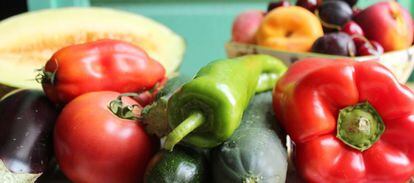Is it really healthier to be vegetarian?
With more people cutting down on meat, a top nutritionist dissects the main arguments

“If a vegetarian and a meat eater were shot and killed, the body of the vegetable eater would take two to three times as long to become intolerably offensive from the process of putrefaction,” maintained Sylvester Graham, a 19th-century dietary reformer who did much to advance vegetarianism in the United States.
Nobody knows whether the father of graham crackers ever put his theory to the test. In any event, a lot of water has passed under the bridge since then, and vegetarianism has become a rising food trend. Fortunately, the arguments in its favor have become more solid in the process.
Sylvester Graham saw vegetarianism mostly as a useful tool to reduce the “risk” of indulging in masturbation, which he believed could lead to blindness
But what do all the existing forms of vegetarianism mean? And is it truly healthier to be a vegetarian than to eat all kinds of food?
The market analysis consultancy Euromonitor International predicted the world’s renewed interest in eating more greens in a report titled “Top 10 Global Consumer Health and Wellness Trends for 2014,” which underscored the international community’s interest in reducing meat intake and increasing vegetable consumption. Both forecasts have been fully confirmed since then.
Vegetarianism and health
In 2009, the American Dietetic Association published a paper asserting that “appropriately planned vegetarian diets, including total vegetarian or vegan diets, are healthful, nutritionally adequate, and may provide health benefits in the prevention and treatment of certain diseases. Well-planned vegetarian diets are appropriate for individuals during all stages of the life cycle, including pregnancy, lactation, infancy, childhood, adolescence, and for athletes.”
It is important to note that, while vegetarian diets need to pay special attention to certain nutrients, such as omega-3 fatty acids, iron, zinc, iodine, calcium, vitamin D and vitamin B12, only the last one poses a challenge in terms of ensuring adequate intake. Supplements in the form of pills or injections can help maintain healthy levels.
Adolf Hitler had a passion for Leberknödel, stewed doves and other delicacies that definitely lack roots or leaves
As for its effectiveness in lowering mortality rates or extending longevity, the benefits of vegetarianism are less clear. There is no consensus: some recent studies show lower mortality caused by heart disease and cancer among vegetarians, while others see no significant differences between vegetarians and non-vegetarians.
Clearly, it is impossible to make categorical statements either way, since for now at least there are as many arguments in favor of one or the other.
The origins of vegetarianism
Vegetarianism has no specific known origin. Some cultures, often influenced by religious precepts, evolved independently towards some form of the practice, each with its own particularities and explanations.
But it wasn’t until the early 19th century that this type of lifestyle began making serious inroads in the general population.
The first shoots of the movement are to be found in the Anglo-Germanic world, which influenced a few leading Americans with a special knack for establishing odd correlations.
The aforementioned Graham, for instance, was one of the earliest champions of the practice. Except that the Presbyterian reverend saw vegetarianism mostly as a useful tool for reducing the “risk” of indulging in masturbation, which he believed could lead to blindness.

This fanatical puritan’s solution to this and other ‘ills’ was a diet that was essentially vegetarian, avoiding substances that might stimulate the body into feeling lust, such as meat and alcohol.
He was not the only one to come forward with zany recommendations for curing all kinds of real or perceived diseases. Doctor John Harvey Kellogg (yes, the creator of cornflakes), did not lag far behind Graham in his promotion of vegetarian diets, enemas and other solutions to ills that, he believed, stemmed from a poor morality that sank its roots in the presence of meat in one’s diet.
Beyond the sexual issues attributed to vegetarian diets, it bears noting how nonsensical it is to associate such regimes with non-violence. And by that, I am not talking about the violence exercised against animals when they are sacrificed for food. I mean the notion that vegetarians are less violent people.
Let us recall that Adolf Hitler’s dietary habits have often been described as vegetarian, although some historians claim that this image was the result of an idea extended by his propaganda minister Joseph Goebbels. In reality, the genocidal leader’s diet would best be described as flexitarian, as he was well known for his passion for Leberknödel (handrolled balls of bread, egg and beef liver that are often eaten in soups), stewed doves and other delicacies that definitely lack roots and leaves.
Eating more veggies is good for you and for the planet
The above-mentioned stories are merely anecdotal, but it’s good to have them handy when someone starts praising the superiority of vegetarianism from all possible angles.
Regardless of whether you become a strict vegetarian, a vegan, an ovo-lacto vegetarian or a flexitarian, there is one piece of advice that seems definitely beneficial. Consumers as a rule tend to have low vegetable intakes, and our health would benefit if we increased our levels of vegetable consumption.
Eating fewer animal-based foods would make our planet resource management more efficient and sustainable
In fact, the World Health Organization sets a minimum daily target of 400 grams a day of fruit, vegetables and legumes – a figure that, on average, Spaniards are far from reaching.
Eating fewer animal-based foods would also make our planet resource management more efficient and sustainable. A study published a little over a year ago in Nature explores this issue at length.
So whatever you decide to eat in the end, try to think green as often as possible: the world – and your health – will thank you for it.
English version by Susana Urra.













































